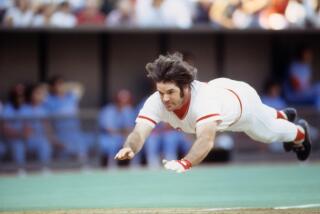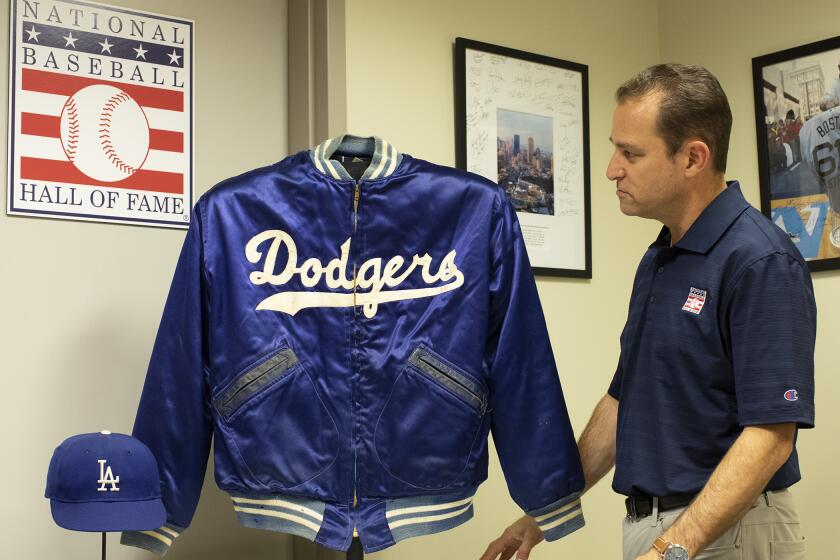For one memorable night, baseball was child’s play
- Share via
On the hot summer evening that Joe Louis Reliford made his professional baseball debut in 1952, he was unaware, unconcerned and unimpressed that he had broken the color barrier in the Class-D Georgia State League.
But that’s understandable.
He was 12 years old.
“I was just a little child,” says Reliford, who will turn 68 this year but still introduces himself as “the world’s youngest professional baseball player,” a distinction also noted with pride on Reliford’s telephone answering machine and in the National Baseball Hall of Fame and Museum in Cooperstown, N.Y., the Guinness Book of World Records and Ripley’s Believe It or Not. It’s also mentioned in his book, “From Batboy to the Hall of Fame.”
Reliford, who is trying to turn his story into a movie, was indeed a batboy. The ninth of 10 children being reared by a single mother in southern Georgia -- his father died when Reliford was 4 -- Reliford was 10 when he went to work for the Fitzgerald Pioneers.
The job paid $68 every two weeks, and the ballpark was only a few blocks from his home -- on the other side of the railroad tracks.
What a sweet gig for a baseball-loving youngster.
In 1952, he was befriended by second baseman and interim manager Charlie Ridgeway, who took him under his wing and “treated me just like I was his son,” says Reliford, a retired deputy sheriff, city commissioner and jukebox mechanic living in Douglas, Ga., about four hours southeast of Atlanta.
When not tending to his duties as batboy, the eager Reliford practiced with the Pioneers, shagging fly balls, warming up pitchers, fielding grounders and occasionally taking cuts in the batting cage.
“The manager, he knew that I could play,” Reliford says of Ridgeway, who is 83, suffering from colon cancer and still living in Fitzgerald.
Then came July 19, 1952.
In a game at Statesboro, Ga., played in front of a crowd packed with members of a local Elks Lodge, the Pioneers fell behind, 13-0. The Elks, reportedly feeling no pain after a night of drinking, started calling for Ridgeway to “put in the batboy.”
To their surprise, he did. “It was all in fun,” says Ridgeway, who consulted with umpire Ed Kubick before sending Reliford to the plate in the eighth inning to pinch-hit against Curtis White, who was working on a two-hitter.
“I knew he was going to pitch kind of easy to me and I was going to hit it,” Reliford says, “but he cut loose with a fastball and he made me angry when he did. I was only 4 feet 11 inches tall. I weighed about 68 pounds. And I said to myself, ‘He’s trying to show me up now.’ ”
The next pitch was a fastball too, Reliford says, but this time he was ready. He hit the ball squarely, ripping a grounder down the third base line. Unfortunately, though, the third baseman made a backhanded stop and threw him out by a step.
But then Ridgeway surprised him anew, telling Reliford to grab his glove and head out to right field for the bottom of the eighth. It was there, with a runner on first base, that the youngster fielded a ground-ball single through the right side and came up throwing.
“I guess the runner on first thought I couldn’t throw him out because I was a child,” Reliford says, pride evident in his voice 55 years later. “But when he got to third base that ball was there waiting for him. I threw him out.”
Up came Harold Shuster, a Statesboro slugger who had one last chance to extend a 21-game hitting streak. Shuster belted a drive toward the right-field corner, but Reliford raced back to the fence and made an over-the-shoulder catch.
“Them bleachers emptied,” Reliford says of the chaotic aftermath, in which the crowd startled him by rushing onto the field to revel in his spectacular catch. “Can you imagine what I was feeling, with all them white people coming straight toward me? I caught that man’s ball, I wasn’t supposed to be on the field and he was a white man? Man, I was scared. Back then, a lot of hangings and stuff like that was going on. I wasn’t too little to know about all of that.”
It wasn’t until later, after Ridgeway reassured him, that Reliford discovered that the excited fans had stuffed his pockets full of money.
“But that didn’t stop me from crying,” he says. “I didn’t stop crying until I was on that bus and we were leaving Statesboro.”
Reliford’s moment of glory was captured in numerous newspaper articles, but his brief appearance cost him his job. Ridgeway was fired as manager, fined $50 and suspended. Kubick, the umpire, also was fired.
And Reliford never again played in a professional game.
Though he says he was a four-sport letterman in high school and earned an athletic scholarship to Florida A&M;, he never played in college, either, after suffering a broken collarbone in football practice before his freshman season.
But he’ll always have Statesboro and his time in the spotlight, an event Reliford has since had commemorated on T-shirts, baseball cards and miniature bats.
“I remember it just like it was yesterday,” he says.
More to Read
Go beyond the scoreboard
Get the latest on L.A.'s teams in the daily Sports Report newsletter.
You may occasionally receive promotional content from the Los Angeles Times.










